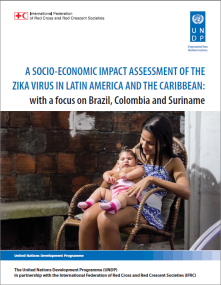A socio-economic impact assessment of the Zika Virus in Latin America and the Caribbean: with a focus on Brazil, Colombia and Suriname
 In early 2016, Zika was declared a Public Health Emergency of International Concern due to its association with a surge of birth defects. Zika has since spread throughout Latin America and the Caribbean, with local transmission also reported in parts of the USA, Asia and Africa. The nature of the neurological complications Zika can cause in humans, and the emergence of a condition in infants known as ‘congenital Zika syndrome’, have posed and continue to pose a significant challenge to health specialists, international organizations and governments alike. The United Nations Development Programme (UNDP), in partnership with the International Federation of the Red Cross and Red Crescent Societies (IFRC), produced this assessment of the socio-economic impacts of Zika on countries, families and communities, and to examine institutional responses. The assessment offers three conclusions: First, the current Zika epidemic will have a long-term impact, and countries will incur high direct and indirect costs as a result. Second, there is a profound equity challenge at the core of the Zika epidemic. The impact is disproportionate on the poorest countries of the region, as well as on the poorest and most vulnerable groups, especially poor women in peri-urban communities. Third, regional and national preparedness and response strategies require strengthening and must involve affected communities.
In early 2016, Zika was declared a Public Health Emergency of International Concern due to its association with a surge of birth defects. Zika has since spread throughout Latin America and the Caribbean, with local transmission also reported in parts of the USA, Asia and Africa. The nature of the neurological complications Zika can cause in humans, and the emergence of a condition in infants known as ‘congenital Zika syndrome’, have posed and continue to pose a significant challenge to health specialists, international organizations and governments alike. The United Nations Development Programme (UNDP), in partnership with the International Federation of the Red Cross and Red Crescent Societies (IFRC), produced this assessment of the socio-economic impacts of Zika on countries, families and communities, and to examine institutional responses. The assessment offers three conclusions: First, the current Zika epidemic will have a long-term impact, and countries will incur high direct and indirect costs as a result. Second, there is a profound equity challenge at the core of the Zika epidemic. The impact is disproportionate on the poorest countries of the region, as well as on the poorest and most vulnerable groups, especially poor women in peri-urban communities. Third, regional and national preparedness and response strategies require strengthening and must involve affected communities.
